¿Qué es la entrega? hermosa respuesta y la analogía por Sri Sathya Sai Baba
Sharanagathi vs entrega - un mundo de diferencia
El diccionario define la rendición como 'darse por vencido, entregar o enviar a la autoridad'. Por lo tanto, la entrega se entiende para significar oft capitulación o marcha atrás. Connota debilidad y la incapacidad de resistir. Se considera como el último recurso de los que no son lo suficientemente valiente porque el valiente preferiría perder todo lo que rendirse! Sin embargo, Sharanagathi (que se traduce en Inglés como 'rendirse') es muy diferente. También es una especie de 'renunciar', pero no es la capitulación. En lugar de debilidad, que connota fuerza, humildad y sabiduría. Es el primer complejo de la valiente porque aquellos que no son valientes no merecen la paz y la alegría que trae.
Así que, ¿qué es esto Sharangathi (rendición) que es completamente opuesto en su significado en comparación con la entrega que se define en los diccionarios de inglés? Aquí es un episodio preciosa en la que Bhagavan Sri Sathya Sai Baba explicó a un estudiante de la universidad el significado espiritual de entrega y sus hermosas beneficios.
Después de la realización con éxito de la Ati Rudra Maha Yagnam en Prashanti Nilayam en agosto de 2006, Swami (como Baba se llama amor) decidió llevar a cabo la misma en la ciudad de Chennai en enero de 2007. Ha sido mi experiencia que Swami siempre 'bendice' más de 2 pájaros con la misma piedra ! La visita a Chennai no fue la excepción con varias cosas que se logra por ella. El Cónclave de Madrás Ciudadana celebrada el 21 de enero fue uno de esos 'pájaro', que fue bendecido pero eso es una historia aparte por sí mismo.
destellos rápidos de la visita de Chennai
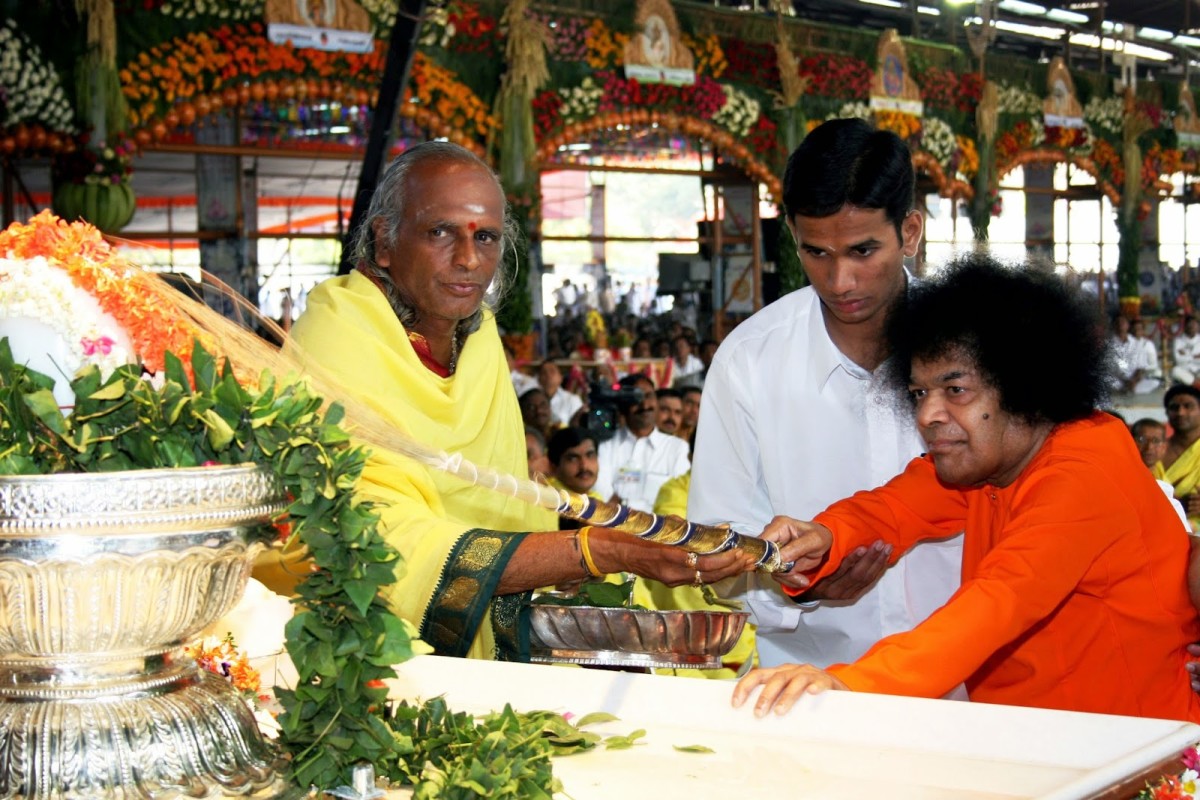
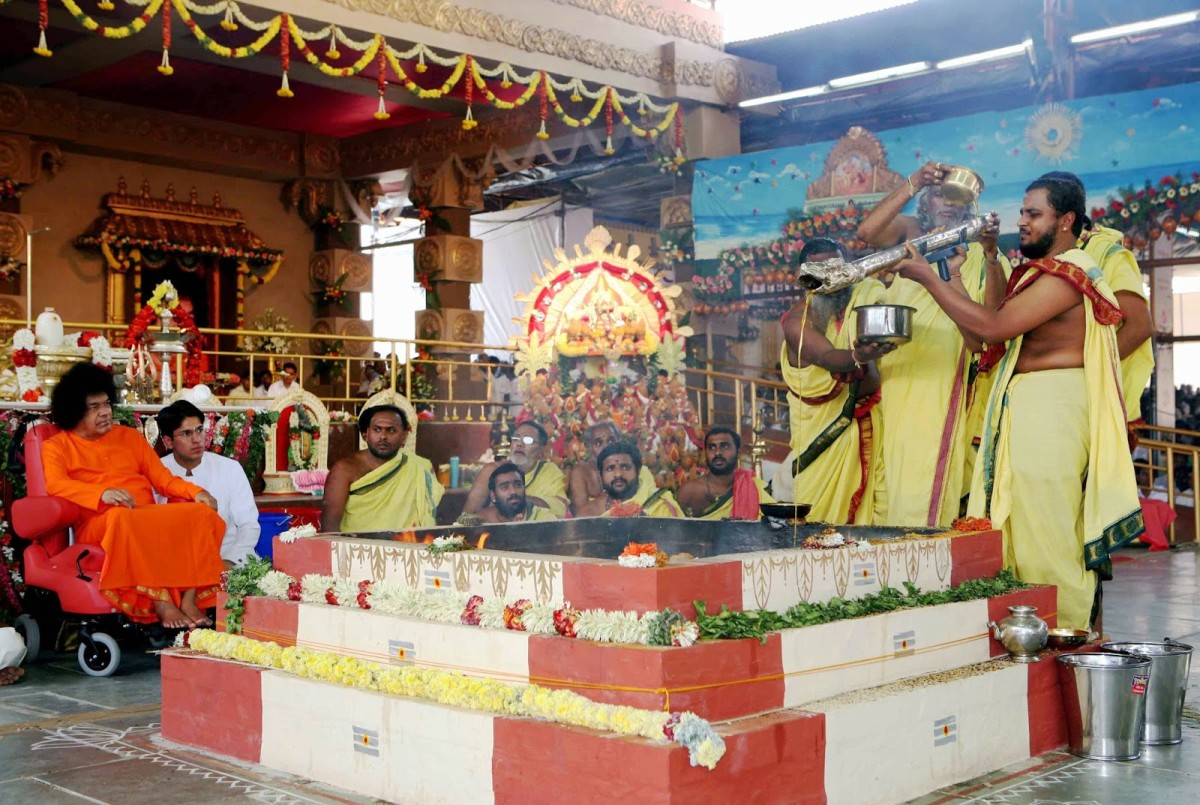
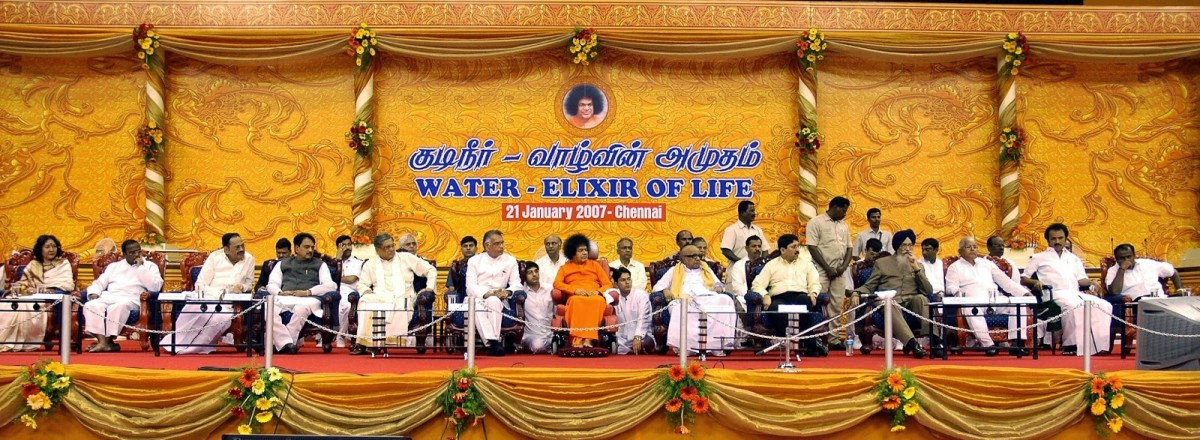
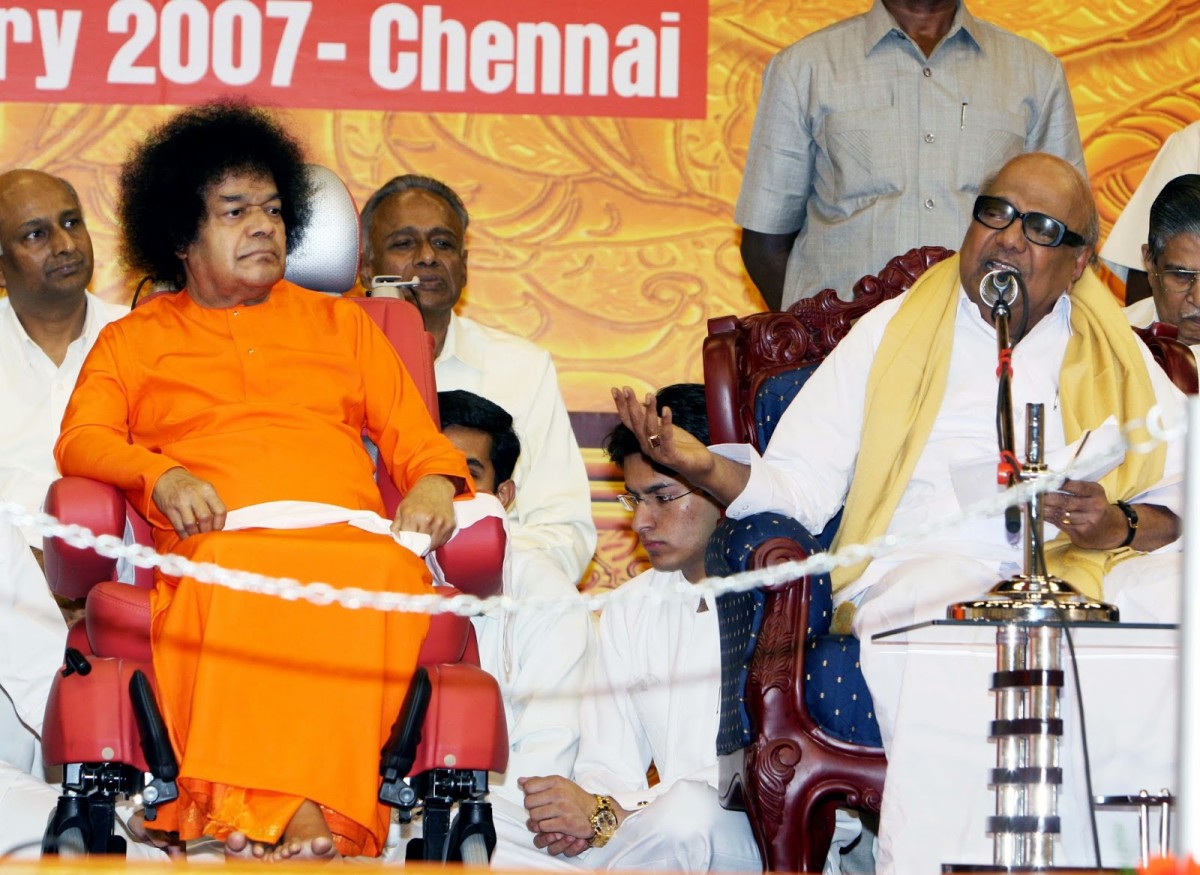
Para el Ati Rudra Maha Yagnam, Swami había recogido varios estudiantes para acompañar a Él. Los 'deberes' de estos estudiantes involucrados pronunciar un discurso cada uno durante cada día de la Yagnam. Mi compañero de clase, Jagdish Chandra, fue uno entre los varios estudiantes que formaban parte de la comitiva de Bhagavan. Este hermoso diálogo sobre el verdadero significado de la rendición pasó entre Jagdish y Swami. Tal como soy agradecido a Arjuna por preguntar sus dudas del Señor Krishna, estoy agradecido a Jagdish para este diálogo con Swami porque el mensaje es tan conmovedor como el Bhagavad Gita. De hecho, creo que es un resumen conciso de la Gita.
Esta narración es en las propias palabras de Jagdish ahora.
Aclaración por Guru Guru en?
"Estaba a dar una charla en la tarde del día siguiente Thiruvanmiyur. La noche anterior, ya que estábamos teniendo una cena con Bhagwan, Swami preguntó acerca de quién se habla. Swami había decidido el orden de los altavoces de antemano, y por lo tanto, sabía que era mi turno. Me presenté en consecuencia.
" Yemi maatladutavu (¿Qué vas a hablar)?"
"Swami me gustaría hablar de Swami como nuestro Guru ... ''
"Aha! ¿Cuál es el significado de Guru?"
'Swami, en los textos sagrados se afirma que, en el gurú de la palabra, se asienta 'Gu' para Gunateeta (más allá de los atributos) y 'Ru' es sinónimo de Roopavarjita (más allá de las formas).'
"Alanti vallani yavarinena choosava (¿alguna vez se encuentra con alguien, un Guru, así)?"
Yo estaba asombrado porque yo estaba en la presencia misma de tal Ser, mi Guru. Señalé mis manos plegadas hacia Swami y dije,
" Swami meeru (Usted Swami)!"
" Kani naaku Roopam unde (pero tengo un formulario)!"
Swami se refería a la contradicción con la definición de Guru que había elegido.
" Swami Roopam Undina lekapoyina, meere na Guru (Swami, con o sin forma, sólo sé que seas mi Guru)!"
Swami sonrió. Entonces me preguntó los detalles de mi charla, que le dije. Estaba feliz por el interés que mostraba en mi charla. Sin embargo, al final de nuestra conversación, sorprendentemente Swami dijo a cada uno alrededor,
" Naaku telusu, me andara manusulo Chaala duda unnayee. Ee Rozu annee chestanu clara. Adagandi. (Lo sé, todos ustedes tienen muchas dudas en su mente. Voy a despejar las dudas de hoy. Pregunta!)"
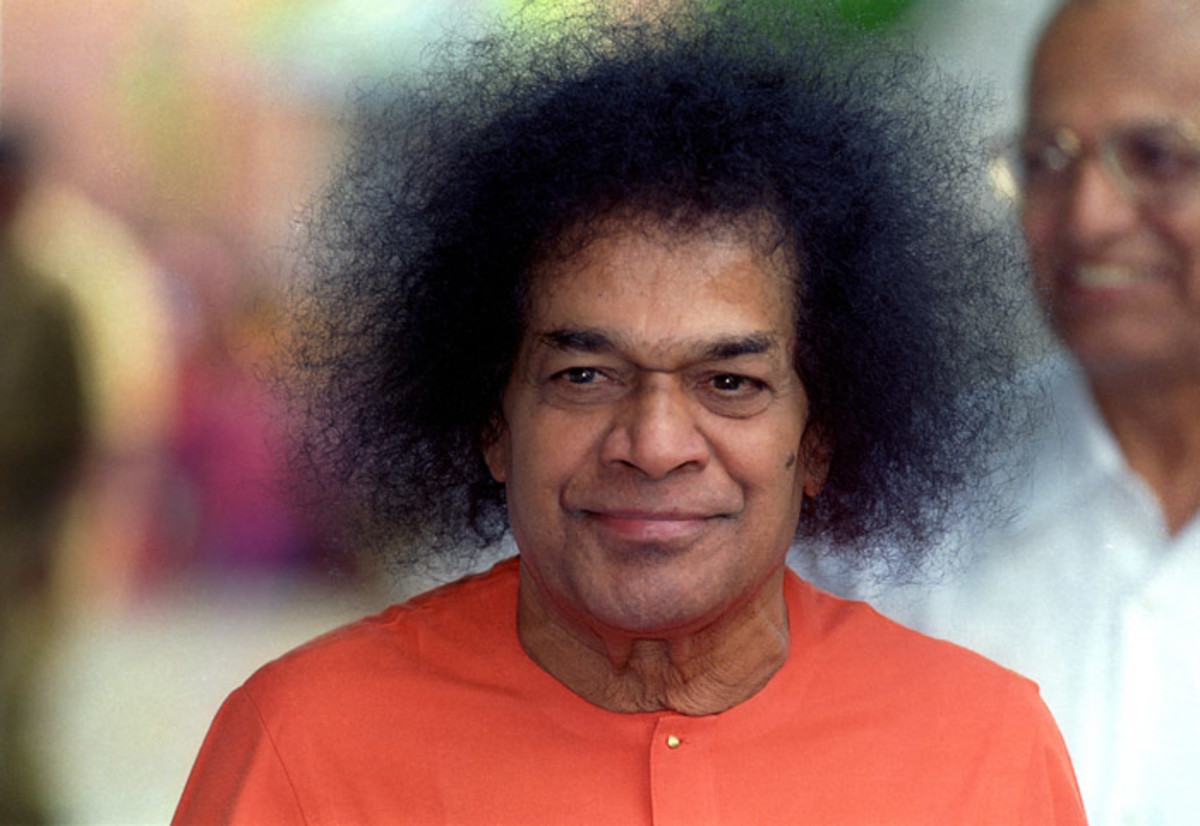
Un diálogo sobre la rendición con Dios
No era sólo maná del cielo, sino en verdad el cielo mismo! Cada uno de nosotros elegimos a preguntar qué estaba más al interior de nuestros corazones. Cuando llegó mi turno, mi pregunta era,
" Swami, Sharanagati ante yemi (Swami, ¿cuál es el significado de la entrega)?"
" Sharanagati ante neeku yemi artham ayyinndo, mundu adi cheppu (Primero me dice lo que ha entendido de la palabra Sharanagathi).
"Swami, de lo poco que he leído y oído de los ancianos, ofreciendo mi todo a Dios es la entrega ..."
! "Dios no quiere nada de usted señor" Swami dijo, "En cada punto en el tiempo si usted se recuerda - 'Lo que está sucediendo es bueno para mí' - a continuación, se han rendido a mí ".
Swami continuó explicando.
"¿Usted sabe cómo conducir un coche?"
"Sí, Swami ..."
"¿Cuántas marchas están allí en el coche?"
"Swami 4 ..."
"Sí! Primera, segunda, tercera y cuarta marcha. También hay una marcha atrás. Dime, ¿hay algún problema cuando el coche se queda en el primer equipo?"
'No Swami ...'
'¿Qué pasa con la segunda o tercera o la cuarta marchas?'
'No hay problemas Swami ...'
"Entonces, ¿dónde está el ¿problema?"
Me encogí de hombros en la ignorancia. Swami respondió a su propia pregunta.
"El problema viene cuando hay un cambio de marchas! Por lo tanto, ¿qué hacer cuando se cambia de marcha en un coche?"
'Swami, utilizamos el embrague'
"correcta! Cuando se utiliza el embrague, el cambio de marchas es suave. Del mismo modo en la vida, hay engranajes - frontal y trasera - la felicidad, la tristeza, la felicidad, la tristeza. Al igual que en coche, nuestras vidas también continúan si estamos en la felicidad o en el dolor, pero el problema surge sólo cuando hay un cambio o transición de la felicidad a la tristeza y viceversa. Para la vida también hay un embrague. El embrague de la vida es la idea de que, 'Pase lo que pase es bueno para mí' ".

Los problemas, mientras que el cambio de marchas
Ahora que lo pienso de ella, todos los problemas vienen sólo cuando hacemos la transición de la alegría a la tristeza o viceversa. Cuando caemos en la tristeza de la alegría, hay frustración, irritación, la ira y la depresión. Cuando estamos exaltados a la felicidad de una situación dolorosa, hay orgullo, el ego y el apego. Todos ellos son dañinos. En cambio, cuando cae en la tristeza de la alegría o viceversa, si decimos,
"Esto es bueno para mí. Es por eso que Swami está regalando a mí", entonces ninguna de esas negatividades se arise.This técnica se asegurará de que no flotan en el cielo ni enterrarnos bajo tierra. Se asegura de que nuestros pies están firmemente en el suelo. Esto nos llevará a ser ecuánime y, por tanto, de forma permanente pacífica.
Esto es lo que Krishna le dijo a Arjuna en el campo de batalla de Kurukshetra.
sukha-duhkhe misma kṛtvā, labhalabhau jayajayau
(El que es ecuánime en la felicidad, la tristeza, la ganancia-pérdida, la victoria-derrota, es el que se ha entregado realmente !!)
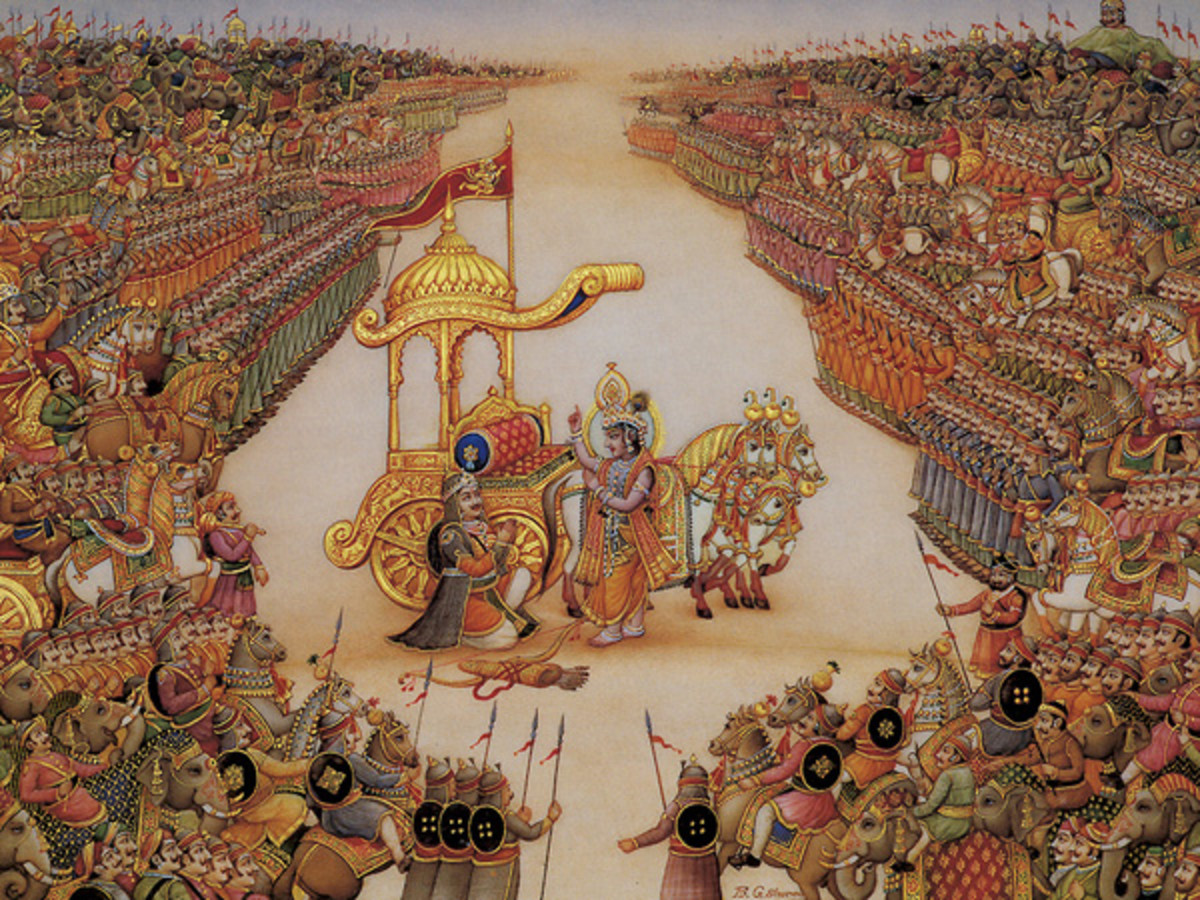
"El que, sigue esto, yo le aseguro sensación completa de la entrega hacia mí!" Swami declaró a Jagdish ese día. Sin embargo, no terminó ahí. Un punto culminante se produjo muy interesante.
Una lección para ser impreso por la vida
Actas de la Yagnam del día siguiente resultó ser catastrófico ya que había un problema con el sistema PA en Thiruvammiyur. Swami fue aparentemente molesto ya que las cosas no podían ser escuchadas correctamente. Aunque Jagdish pronunció su discurso sin problemas, parecía defectuosas gracias al sistema de PA. Swami parecía mirar a Jagdish como queriendo decir que Él no estaba contento con su charla. La confirmación se produjo cuando regresaron a Sundaram, morada de Swami en Chennai.
Swami miró con rabia Jagdish y dijo,
" Yemi ledu baaga maatalad (Usted no habla bien del todo)."
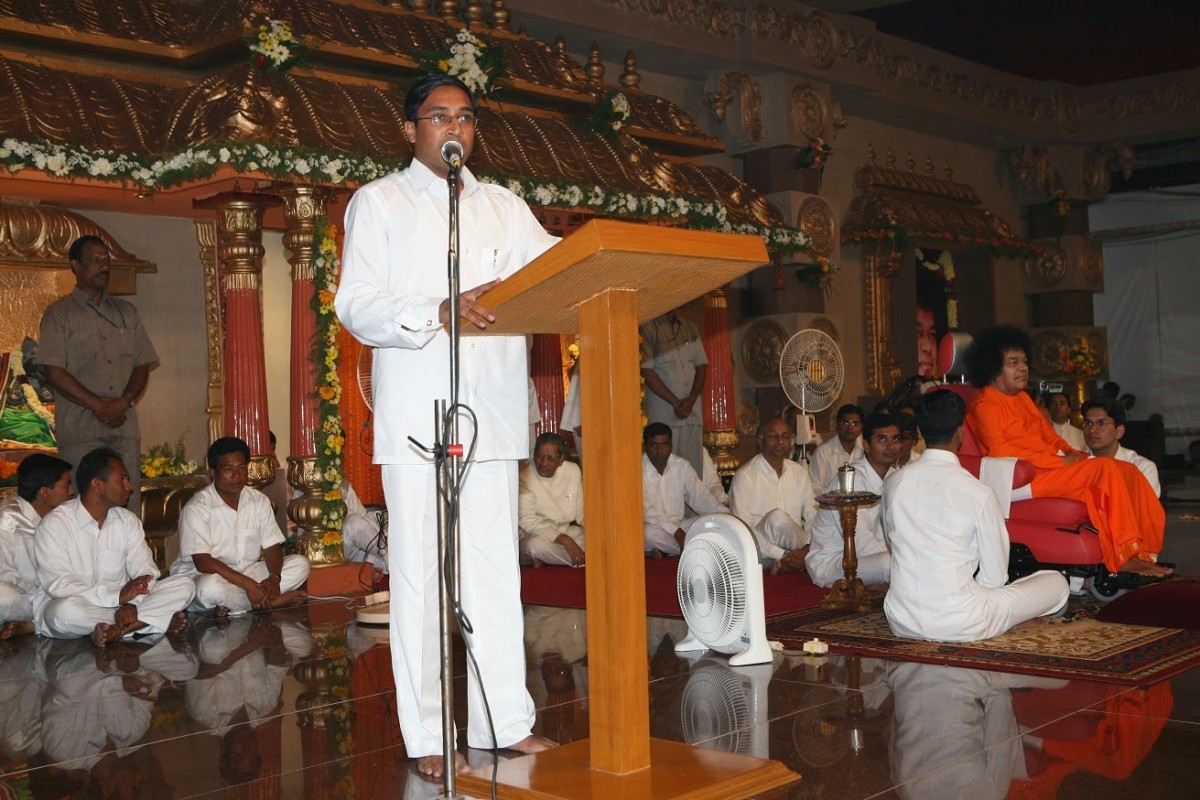
El corazón de Jagdish hundió! El único propósito de hacer cualquier cosa - incluyendo el hablar en presencia divina - es hacer feliz a Swami. A pesar de que toda la sala había aplaudido, no significaba nada para Jagdish porque Swami estaba molesto. Él no tiene la fuerza para hacer frente a Swami incluso durante la sesión de la cena. Irónicamente, ese mismo día, estaba sentado más cerca de Swami para la cena! Swami mal visto él y le preguntó a uno de los devotos mayores,
" E Abbayi Yela matladedu (¿Cómo hizo este chico Hablar)?"
Haciendo caso omiso de lo que había sucedido hasta entonces, el devoto empezó a amontonar alabanzas sobre Jagdish! Cada palabra era como un rasguño en el corazón sangrante de Jagdish y siguió sentado con la cabeza hacia abajo. El estaba muy triste.
Swami simplemente ignorado Jagdish y las palabras de los devotos y dijo en voz alta,
" Yemi baaga maataladledu (no habló nada bien)!"
Luego vino la mayor sacudida de Jagdish. Swami miró y dijo,
" Sharanagati gurinchi okka mukka kuda mataladaledu (Ni siquiera hablar una palabra de rendición)!"
Se refería a la conversación que tuvo lugar el día anterior.
A pesar de toda su abatimiento, la mente de Jagdish rebelaron. Estaba gritando por dentro,
"Swami esto es injusto! No se suponía que hablar sobre ese tema. Mi tema era GURU! ¿Por qué haces esto a mí?"

Inmediatamente Swami preguntó,
" Yemi Raa Nee Sharanagathi (¿Cuál es su entrega)?"
Jagdish fue alcanzado por un rayo. El ruido en la cabeza fue silenciado al instante. Se dio cuenta de que había captado la teoría del día anterior, pero había fracasado en el examen práctico en este día! Él había sido desplazado de la alegría a la tristeza y no se había aplicado el embrague de la rendición diciendo,
"Todo esto es bueno para mí."
E incluso a su entender, una sonrisa parecía florecer en el rostro de Swami. Había tanto amor. Jagdish estaba ahora en lágrimas. Se fue a Swami y dijo,
" Tappu ayyipoyindi Swami, kshaminchandi (he cometido un error. Por favor, perdóname Swami)!"
Swami le sonrió y dijo:
"Su discurso fue bueno".
Esta vez, Jagdish no flotan. Permaneció conectado a tierra. El sabía que el elogio de Swami para él no fue a causa de su gloria. Fue porque era bueno para él.
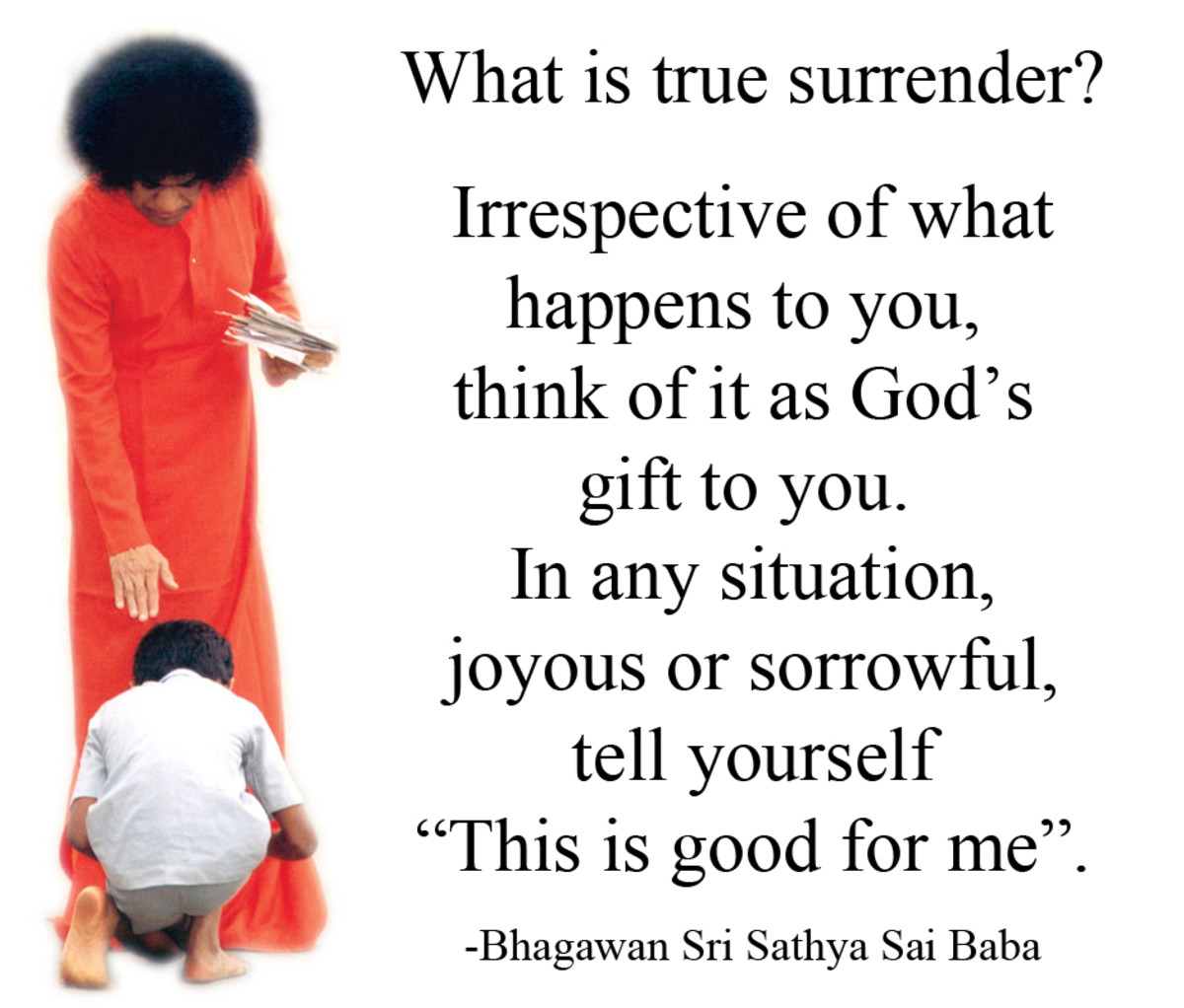
TRADUCIDO EN INTERNET
What is Surrender? Beautiful answer and analogy by Sri Sathya Sai Baba
Sharanagathi vs Surrender - a world of difference
The dictionary defines surrender as 'give up, hand over or submit to authority'. Therefore, surrender is oft understood to mean capitulation or backing down. It connotes weakness and an inability to resist. It is considered as the last resort of those who are not brave enough because the brave would rather lose everything than surrender! However, Sharanagathi (which is translated into English as 'surrender') is very different. It is also a sort of 'giving up' but it is not capitulation. Instead of weakness, it connotes strength, humility and wisdom. It is the first resort of the brave because those that aren't brave do not deserve the peace and joy that it brings.
So, what is this Sharangathi (surrender) which is completely opposite in it's meaning compared to the surrender that is defined in English dictionaries? Here is a lovely episode in which Bhagawan Sri Sathya Sai Baba explained to a college student the spiritual meaning of surrender and it's beautiful benefits.
After the successful conduct of the Athi Rudra Maha Yagnam at Prasanthi Nilayam in August 2006, Swami (as Baba is lovingly called) decided to conduct the same in the city of Chennai in January 2007. It has been my experience that Swami always 'blesses' more than 2 birds with the same stone! The visit to Chennai was no exception with multiple things being achieved by it. The Chennai Citizen's Conclave held on the 21st of January was one such 'bird' which was blessed but that is a separate story by itself.
The dictionary defines surrender as 'give up, hand over or submit to authority'. Therefore, surrender is oft understood to mean capitulation or backing down. It connotes weakness and an inability to resist. It is considered as the last resort of those who are not brave enough because the brave would rather lose everything than surrender! However, Sharanagathi (which is translated into English as 'surrender') is very different. It is also a sort of 'giving up' but it is not capitulation. Instead of weakness, it connotes strength, humility and wisdom. It is the first resort of the brave because those that aren't brave do not deserve the peace and joy that it brings.
So, what is this Sharangathi (surrender) which is completely opposite in it's meaning compared to the surrender that is defined in English dictionaries? Here is a lovely episode in which Bhagawan Sri Sathya Sai Baba explained to a college student the spiritual meaning of surrender and it's beautiful benefits.
After the successful conduct of the Athi Rudra Maha Yagnam at Prasanthi Nilayam in August 2006, Swami (as Baba is lovingly called) decided to conduct the same in the city of Chennai in January 2007. It has been my experience that Swami always 'blesses' more than 2 birds with the same stone! The visit to Chennai was no exception with multiple things being achieved by it. The Chennai Citizen's Conclave held on the 21st of January was one such 'bird' which was blessed but that is a separate story by itself.
Quick glimpses of the Chennai visit
 Swami performs the Prana Pratishta (life-instilling ceremony) for the Sai Sundareshwara Lingam at Chennai at the start of the Athi Rudra Mana Yagna,
Swami performs the Prana Pratishta (life-instilling ceremony) for the Sai Sundareshwara Lingam at Chennai at the start of the Athi Rudra Mana Yagna, The 11-day Yagna came to a close with the Poornahuthi.
The 11-day Yagna came to a close with the Poornahuthi. The sweeping view of the dais during the Chennai Citizens' Conclave where everyone expressed gratitude to Swami for providing water to Chennai.
The sweeping view of the dais during the Chennai Citizens' Conclave where everyone expressed gratitude to Swami for providing water to Chennai. Even the Chief Minister, Karunanidhi, a sworn atheist, seemed to be forced to believe in God because of Swami!
Even the Chief Minister, Karunanidhi, a sworn atheist, seemed to be forced to believe in God because of Swami!For the Athi Rudra Maha Yagnam, Swami had picked several students to accompany Him. The 'duties' of these students involved delivering a speech each during each day of the Yagnam. My classmate, Jagdish Chandra, was one among the several students who were part of Bhagawan's entourage. This beautiful dialogue on the true meaning of surrender happened between Jagdish and Swami. Just as I am grateful to Arjuna for asking his doubts of Lord Krishna, am grateful to Jagdish for this dialogue with Swami because the message is as poignant as the Bhagawad Gita. In fact, I feel it is a concise summary of the Gita.
This narration is in Jagdish's own words now.




For the Athi Rudra Maha Yagnam, Swami had picked several students to accompany Him. The 'duties' of these students involved delivering a speech each during each day of the Yagnam. My classmate, Jagdish Chandra, was one among the several students who were part of Bhagawan's entourage. This beautiful dialogue on the true meaning of surrender happened between Jagdish and Swami. Just as I am grateful to Arjuna for asking his doubts of Lord Krishna, am grateful to Jagdish for this dialogue with Swami because the message is as poignant as the Bhagawad Gita. In fact, I feel it is a concise summary of the Gita.
This narration is in Jagdish's own words now.
Clarification by Guru on Guru?
"I was to give a talk the next afternoon at Thiruvanmiyur. The previous evening, as we were having dinner with Bhagwan, Swami enquired as to who would be speaking. Swami had decided the order of the speakers beforehand, and so, I knew it was my turn. I presented myself accordingly.
"Yemi maatladutavu (What will you speak)?"
"Swami I would speak on Swami as our Guru...''
"Aha! What is the meaning of Guru?"
"Swami, in the sacred texts it is stated that, in the word GURU, 'Gu' stands for Gunateeta (beyond attributes) and 'Ru' stands for Roopavarjita (beyond forms)."
"Alanti vallani yavarinena choosava (Did you ever come across someone, a Guru, like that)?"
I was awestruck for I was in the very presence of such a Being, my Guru. I pointed my folded hands towards Swami and said,
"Swami meeru (You Swami)!"
"Kani naaku roopam unde (But I have a form)!"
Swami was referring to the contradiction to the definition of Guru which I had chosen.
"Swami roopam undina lekapoyina, meere na Guru (Swami, with or without form, I know only you to be my Guru)!"
Swami smiled. He then asked me the details of my talk which I told him. I was happy at the interest he was showing in my talk. However, at the end of our conversation, surprisingly Swami said to everyone around,
"Naaku telusu, me andara manusulo chaala doubts unnayee. Ee rozu annee clear chestanu. Adagandi. (I know, you all have a lot of doubts in your mind. I will clear those doubts today. Ask!)"
 The Guru with a most beautiful and bewitching form....
The Guru with a most beautiful and bewitching form....
"I was to give a talk the next afternoon at Thiruvanmiyur. The previous evening, as we were having dinner with Bhagwan, Swami enquired as to who would be speaking. Swami had decided the order of the speakers beforehand, and so, I knew it was my turn. I presented myself accordingly.
"Yemi maatladutavu (What will you speak)?"
"Swami I would speak on Swami as our Guru...''
"Aha! What is the meaning of Guru?"
"Swami, in the sacred texts it is stated that, in the word GURU, 'Gu' stands for Gunateeta (beyond attributes) and 'Ru' stands for Roopavarjita (beyond forms)."
"Alanti vallani yavarinena choosava (Did you ever come across someone, a Guru, like that)?"
I was awestruck for I was in the very presence of such a Being, my Guru. I pointed my folded hands towards Swami and said,
"Swami meeru (You Swami)!"
"Kani naaku roopam unde (But I have a form)!"
Swami was referring to the contradiction to the definition of Guru which I had chosen.
"Swami roopam undina lekapoyina, meere na Guru (Swami, with or without form, I know only you to be my Guru)!"
Swami smiled. He then asked me the details of my talk which I told him. I was happy at the interest he was showing in my talk. However, at the end of our conversation, surprisingly Swami said to everyone around,
"Naaku telusu, me andara manusulo chaala doubts unnayee. Ee rozu annee clear chestanu. Adagandi. (I know, you all have a lot of doubts in your mind. I will clear those doubts today. Ask!)"

A dialogue on surrender with God
It was not merely manna from the heaven but verily the heaven itself! Each one of us chose to ask what was innermost in our hearts. When my turn came, my question was,
"Swami, Sharanagati ante yemi (Swami, what is the meaning of Surrender)?"
"Sharanagati ante neeku yemi artham ayyinndo, mundu adi cheppu (First you tell me what you have understood of the word Sharanagathi).
"Swami, of what little I have read and heard from elders, offering my everything to God is Surrender..."
"GOD DOES NOT WANT ANYTHING FROM YOU SIR!" Swami said, "At every point in time if you remind yourself - 'Whatever is happening is good for me' - then you have surrendered to me."
Swami continued to explain.
"Do you know how to drive a car?"
"Yes Swami..."
"How many gears are there in the car?"
"Swami 4..."
"Yes! First, second, third and fourth gear. There is also a reverse gear. Tell me, is there any problem when the car runs in the first gear?"
"No Swami..."
"What about the second or third or the fourth gears?"
"No problems Swami..."
"Then where is the problem?"
I just shrugged in ignorance. Swami answered His own question.
"The problem comes when there is a change of gears! So what do you do when you change gears in a car?"
"Swami, we use the clutch"
"Correct! When you use the clutch, the change of gears is smooth. Similarly in life, there are gears - front and back - HAPPINESS, SORROW, HAPPINESS, SORROW. Just as in car, our lives too continue whether we are in happiness or in sorrow but the problem arises only when there is change or transition from happiness to sorrow and vice versa. For life too there is a clutch. The clutch for life is the thought that, 'Whatever happens is good for me'."
 Life constantly shifts between the gears of sorrow and happiness.
Life constantly shifts between the gears of sorrow and happiness.
It was not merely manna from the heaven but verily the heaven itself! Each one of us chose to ask what was innermost in our hearts. When my turn came, my question was,
"Swami, Sharanagati ante yemi (Swami, what is the meaning of Surrender)?"
"Sharanagati ante neeku yemi artham ayyinndo, mundu adi cheppu (First you tell me what you have understood of the word Sharanagathi).
"Swami, of what little I have read and heard from elders, offering my everything to God is Surrender..."
"GOD DOES NOT WANT ANYTHING FROM YOU SIR!" Swami said, "At every point in time if you remind yourself - 'Whatever is happening is good for me' - then you have surrendered to me."
Swami continued to explain.
"Do you know how to drive a car?"
"Yes Swami..."
"How many gears are there in the car?"
"Swami 4..."
"Yes! First, second, third and fourth gear. There is also a reverse gear. Tell me, is there any problem when the car runs in the first gear?"
"No Swami..."
"What about the second or third or the fourth gears?"
"No problems Swami..."
"Then where is the problem?"
I just shrugged in ignorance. Swami answered His own question.
"The problem comes when there is a change of gears! So what do you do when you change gears in a car?"
"Swami, we use the clutch"
"Correct! When you use the clutch, the change of gears is smooth. Similarly in life, there are gears - front and back - HAPPINESS, SORROW, HAPPINESS, SORROW. Just as in car, our lives too continue whether we are in happiness or in sorrow but the problem arises only when there is change or transition from happiness to sorrow and vice versa. For life too there is a clutch. The clutch for life is the thought that, 'Whatever happens is good for me'."

The problems while changing gears
Come to think of it, all problems come only when we transition from joy to sorrow or vice versa. When we fall into sorrow from joy, there is frustration, irritation, anger and depression. When we are exalted to happiness from a sorrowful situation, there is pride, ego and attachment. All of them are harmful. Instead, when dropping into sorrow from joy or vice versa, if we say,
"This is good for me. That is why Swami is gifting it to me", then none of those negativities will arise.This technique will ensure that we don't float in the skies nor bury ourselves underground. It makes sure that our feet are firmly on the ground. It will lead us to be equanimous and thus, permanently peaceful.
This is what Krishna told Arjuna in the Kurukshetra battlefield.
sukha-duhkhe same krtva, labhalabhau jayajayau
(The one who is equanimous in happiness-sorrow, profit-loss, victory-defeat, is the one who has truly surrendered !! )
 Lord Krishna instructs the great warrior and devotee- Arjuna
Lord Krishna instructs the great warrior and devotee- Arjuna"Whosoever, follows this, I assure him complete feeling of surrender towards me!" Swami declared to Jagdish that day. But, it did not end there. A very interesting climax ensued.
Come to think of it, all problems come only when we transition from joy to sorrow or vice versa. When we fall into sorrow from joy, there is frustration, irritation, anger and depression. When we are exalted to happiness from a sorrowful situation, there is pride, ego and attachment. All of them are harmful. Instead, when dropping into sorrow from joy or vice versa, if we say,
"This is good for me. That is why Swami is gifting it to me", then none of those negativities will arise.This technique will ensure that we don't float in the skies nor bury ourselves underground. It makes sure that our feet are firmly on the ground. It will lead us to be equanimous and thus, permanently peaceful.
This is what Krishna told Arjuna in the Kurukshetra battlefield.
sukha-duhkhe same krtva, labhalabhau jayajayau
(The one who is equanimous in happiness-sorrow, profit-loss, victory-defeat, is the one who has truly surrendered !! )

"Whosoever, follows this, I assure him complete feeling of surrender towards me!" Swami declared to Jagdish that day. But, it did not end there. A very interesting climax ensued.
A lesson to be imprinted for life
The next day's proceedings of the Yagnam turned out to be catastrophic as there was a problem with the PA system at Thiruvammiyur. Swami was apparently upset as things could not be heard properly. Though Jagdish delivered his speech flawlessly, it seemed flawed thanks to the PA system. Swami seemed to look at Jagdish as if to say that He wasn't happy with his talk. The confirmation came when they returned to Sundaram, Swami's abode in Chennai.
Swami looked at Jagdish angrily and said,
"Yemi baaga maatalad ledu (You didn't speak well at all)."
 Jagdish Chandra speaking in the Divine Presence at the Athi Rudra Maha Yagnam.
Jagdish Chandra speaking in the Divine Presence at the Athi Rudra Maha Yagnam.Jagdish's heart sank! The sole purpose of doing anything - including speaking in the Divine presence - is to make Swami happy. Even though the whole hall had applauded, it meant nothing to Jagdish because Swami was upset. He did not have the strength to face Swami even during the dinner session. Ironically, that very day, he was seated closest to Swami for dinner! Swami frowned upon him and asked one of the senior devotees,
"E abbayi yela matladedu (How did this boy speak)?"
Oblivious of what had happened until then, the devotee started heaping praises on Jagdish! Every word was like a scratch on Jagdish's bleeding heart and he continued to sit with his head down. He was very sad.
Swami simply ignored Jagdish and the words of the devotee and said aloud,
"Yemi baaga maataladledu (Didn't speak well at all)!"
Then came the biggest jolt for Jagdish. Swami looked at him and said,
"Sharanagati gurinchi okka mukka kuda mataladaledu (You didn't even speak a word about Surrender)!"
He was referring to the conversation that took place the previous day.
In spite of all his dejection, Jagdish's mind revolted. He was screaming inwardly,
"Swami this is unfair! I was not supposed to speak on that topic. My topic was GURU! Why are you doing this to me?"
 SUNDARAM - Bhagawan's mandir at Chennai. The name means 'Beauty'. It was the venue of the beautiful dialogue on surrender.
SUNDARAM - Bhagawan's mandir at Chennai. The name means 'Beauty'. It was the venue of the beautiful dialogue on surrender.Immediately Swami asked,
"Yemi Raa Nee Sharanagathi (What is your Surrender)?"
Jagdish was hit by a thunderbolt. The noise in his head was instantly silenced. He realized that he had grasped the theory the previous day but had failed in the practical exam on this day! He had been shifted from joy to sorrow and he hadn't applied the clutch of surrender by saying,
"This is all good for me."
And even as he understood, a smile seemed to blossom on Swami's face. There was so much love. Jagdish was now in tears. He went to Swami and said,
"Tappu ayyipoyindi Swami, kshaminchandi (I made a mistake. Please forgive me Swami)!"
Swami smiled at him and said,
"Your speech was good."
This time, Jagdish did not float. He remained grounded. He knew that Swami's praise for him was not because of his glory. It was because it was good for him.

The next day's proceedings of the Yagnam turned out to be catastrophic as there was a problem with the PA system at Thiruvammiyur. Swami was apparently upset as things could not be heard properly. Though Jagdish delivered his speech flawlessly, it seemed flawed thanks to the PA system. Swami seemed to look at Jagdish as if to say that He wasn't happy with his talk. The confirmation came when they returned to Sundaram, Swami's abode in Chennai.
Swami looked at Jagdish angrily and said,
"Yemi baaga maatalad ledu (You didn't speak well at all)."

Jagdish's heart sank! The sole purpose of doing anything - including speaking in the Divine presence - is to make Swami happy. Even though the whole hall had applauded, it meant nothing to Jagdish because Swami was upset. He did not have the strength to face Swami even during the dinner session. Ironically, that very day, he was seated closest to Swami for dinner! Swami frowned upon him and asked one of the senior devotees,
"E abbayi yela matladedu (How did this boy speak)?"
Oblivious of what had happened until then, the devotee started heaping praises on Jagdish! Every word was like a scratch on Jagdish's bleeding heart and he continued to sit with his head down. He was very sad.
Swami simply ignored Jagdish and the words of the devotee and said aloud,
"Yemi baaga maataladledu (Didn't speak well at all)!"
Then came the biggest jolt for Jagdish. Swami looked at him and said,
"Sharanagati gurinchi okka mukka kuda mataladaledu (You didn't even speak a word about Surrender)!"
He was referring to the conversation that took place the previous day.
In spite of all his dejection, Jagdish's mind revolted. He was screaming inwardly,
"Swami this is unfair! I was not supposed to speak on that topic. My topic was GURU! Why are you doing this to me?"

Immediately Swami asked,
"Yemi Raa Nee Sharanagathi (What is your Surrender)?"
Jagdish was hit by a thunderbolt. The noise in his head was instantly silenced. He realized that he had grasped the theory the previous day but had failed in the practical exam on this day! He had been shifted from joy to sorrow and he hadn't applied the clutch of surrender by saying,
"This is all good for me."
And even as he understood, a smile seemed to blossom on Swami's face. There was so much love. Jagdish was now in tears. He went to Swami and said,
"Tappu ayyipoyindi Swami, kshaminchandi (I made a mistake. Please forgive me Swami)!"
Swami smiled at him and said,
"Your speech was good."
This time, Jagdish did not float. He remained grounded. He knew that Swami's praise for him was not because of his glory. It was because it was good for him.



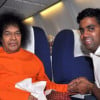












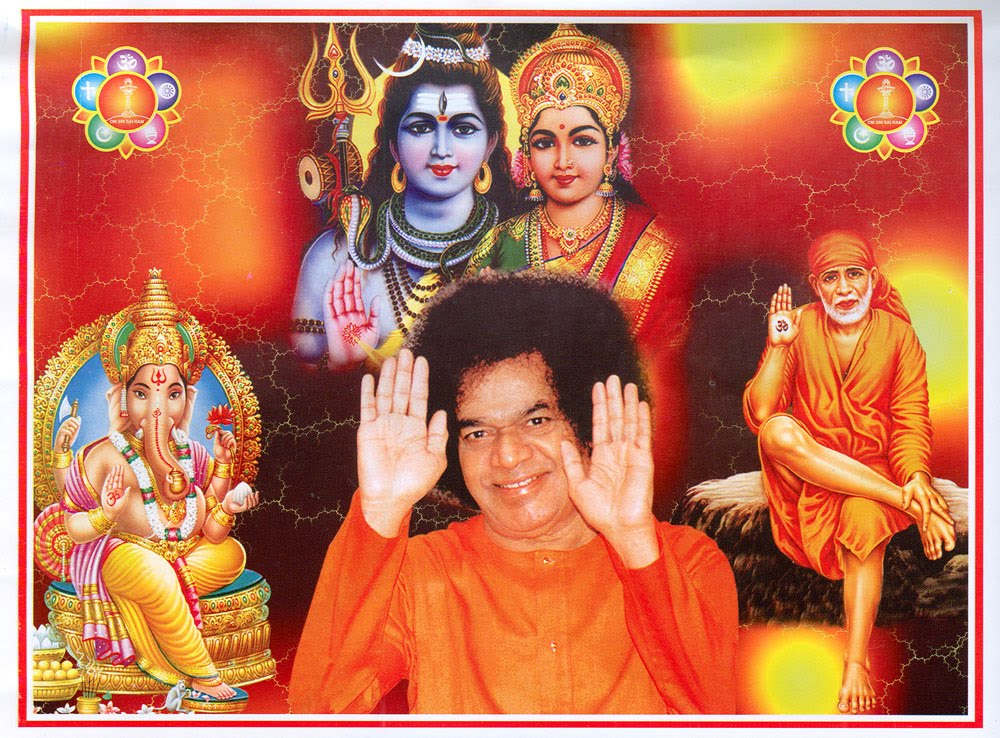






No hay comentarios :
Publicar un comentario